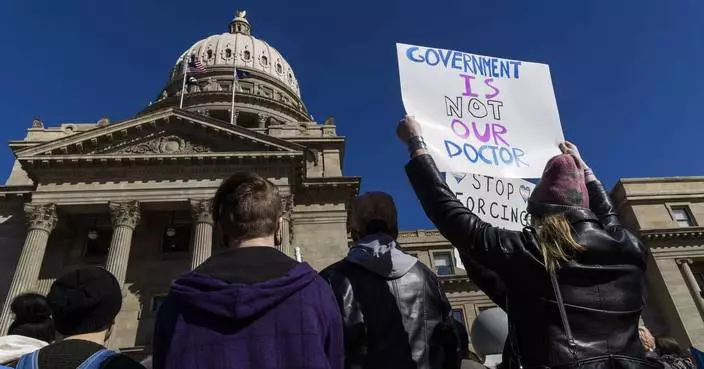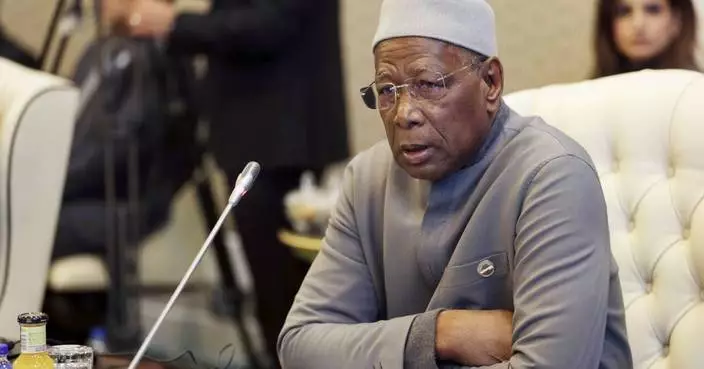Libya’s major oil fields and production facilities remained closed on Monday, its National Oil Corporation said, in a sign that the country's east-based forces are not backing down after an international summit to end the Libyan civil war.
The continued closure of the oil facilities by tribe members loyal to eastern Libyan forces ratchets up pressure on their adversaries in the west, the U.N.-backed government that controls the capital, Tripoli.
World powers with interests in Libya’s long-running conflict pledged on Sunday to respect a much-violated arms embargo and push opposing factions to reach a truce.
But on the ground, tensions remained high. As world leaders convened about military de-escalation, observers said scattered clashes erupted outside Tripoli, testing a tenuous week-old cease-fire.
Former general Khalifa Hifter's east-based forces have been laying siege to the capital for months.
“People are holding their breath,” said Mohamed Eljarh, a political analyst who is based in the eastern city of Tobruk.
“I am worried there is no appetite among the warring parties and their constituencies for a truce right now," Eljarh added.
A doctor and resident of southern Tripoli, Mohamed Malek, 27, said he fled his neighborhood late Sunday when he heard sporadic exchanges of gunfire.
Another Tripoli resident, Ahmed Werfali, 34, said he heard a loud explosion early Monday, and limited fighting overnight. But the violence was far less than the routine pounding of heavy weaponry before the cease-fire, he said.
Dozens of men from tribal groups loyal to Hifter continued on Monday to camp out in two key southern oil fields, including al-Sharara, Libya’s largest.
Hifter's tribal allies closed a major pipeline over the weekend, potentially cutting national output to a small fraction of its normal level, according to the oil corporation.
“This sit-in will continue,” vowed Mohamed Maikal, the leader of the group that seized the fields, known as Fezzan. “There is a pessimistic situation after what happened in Berlin.”
The protesters accuse the Tripoli-based government, which controls Libya’s Central Bank, of using oil revenues to fund military operations against Hifter’s forces.
Oil, the lifeline of Libya’s economy, has long been a key factor in the civil war, as rival authorities jostle for control of oil fields and state revenue.
It remains unclear whether the commitment to halt foreign interference announced in Berlin will prove any more effective in winding down the years-long war in Libya than past pledges that have been widely ignored.
Jalel Harchaoui, a Libya expert at The Netherlands Institute of International Relations, said that the Berlin summit had delivered “absolutely none” of the “concrete mechanisms” needed to ensure all parties to the conflict observe commitments to a truce and de-escalation.
Libya’s two main rival leaders, Prime Minister Fayez Sarraj and former general Hifter, did not sign any documents, let alone appear in the same room. German Chancellor Angela Merkel and her foreign minister said they met the leaders separately ahead of the conference.
Turkish President Recep Tayyip Erdogan, speaking to reporters on his way back from Berlin, criticized Hifter's failure to ink a roadmap for ending the war. “It remained verbal, witnessed by those who participated in the meeting," the state-run Anadolu Agency quoted him as saying.
BEIRUT (AP) — Leaked photographs of the son of Libya’s late dictator Moammar Gadhafi and the tiny underground cell where he has been held for years in Lebanon have raised concerns in the north African nation as Libyan authorities demand improvements.
The photos showed a room without natural light packed with Hannibal Gadhafi’s belongings, a bed and a tiny toilet. “I live in misery,” local Al-Jadeed TV quoted the detainee as saying in a Saturday evening broadcast, adding that he is a political prisoner in a case he has no information about.
Two Lebanese judicial officials confirmed to The Associated Press on Monday that the photographs aired by Al-Jadeed are of Gadhafi and the cell where he has been held for years at police headquarters in Beirut. Gadhafi appeared healthy, with a light beard and glasses.
A person who is usually in contact with Gadhafi, a Libyan citizen, said the photos were taken in recent days. All spoke on condition of anonymity because they were not authorized to speak to media outlets.
Gadhafi has been held in Lebanon since 2015 after he was kidnapped from neighboring Syria, where he had been living as a political refugee. He was abducted by Lebanese militants demanding information about the fate of prominent Lebanese Shiite cleric Moussa al-Sadr, who went missing during a trip to Libya in 1978.
The fate of al-Sadr has been a sore point in Lebanon. His family believes he may still be alive in a Libyan prison, though most Lebanese presume al-Sadr, who would be 95 now, is dead.
A Libyan delegation visited Beirut in January to reopen talks with Lebanese officials on the fate of al-Sadr and the release of Gadhafi. The talks were aimed at reactivating a dormant agreement between Lebanon and Libya, struck in 2014, for cooperation in the probe of al-Sadr. The delegation did not return to Beirut as planned.
The leaks by Al-Jadeed came after reports that Gadhafi was receiving special treatment at police headquarters and that he had cosmetic surgeries including hair transplants and teeth improvements. Al-Jadeed quoted him as saying: “Let them take my hair and teeth and give me my freedom.”
Gadhafi went on a hunger strike in June last year and was taken to a hospital after his health deteriorated.
Libya’s Justice Ministry in a statement Sunday said Gadhafi is being deprived of his rights guaranteed by law. It called on Lebanese authorities to improve his living conditions to one that “preserves his dignity," adding that Lebanese authorities should formally inform the ministry of the improvements. It also said Gadhafi deserves to be released.
After he was kidnapped in 2015, Lebanese authorities freed him but then detained him, accusing him of concealing information about al-Sadr’s disappearance.
Al-Sadr was the founder of the Amal group, a Shiite militia that fought in Lebanon’s 1975-90 civil war and later became a political party that is currently led by the country’s Parliament Speaker Nabih Berri.
Many of al-Sadr’s followers are convinced that Moammar Gadhafi ordered al-Sadr killed in a dispute over Libyan payments to Lebanese militias. Libya has maintained that the cleric, along with two traveling companions, left Tripoli in 1978 on a flight to Rome.
Human Rights Watch issued a statement in January calling for Gadhafi’s release. The rights group noted that Gadhafi was only 2 years old at the time of al-Sadr’s disappearance and held no senior position in Libya as an adult.

FILE - In this undated file photo made available Sept. 25, 2011, Hannibal Gadhafi, son of ousted Libyan leader Moammar Gadhafi, watches an elite military unit exercise in Zlitan, Libya. Leaked photographs of Hannibal Gadhafi and the tiny underground cell where he has been held for years in Lebanon have raised concerns. Libyan authorities are demanding that Lebanon improves living conditions for Gadhafi. (AP Photo/Abdel Magid al-Fergany, File)





